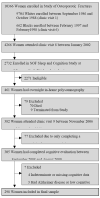Sleep-disordered breathing, hypoxia, and risk of mild cognitive impairment and dementia in older women
- PMID: 21828324
- PMCID: PMC3600944
- DOI: 10.1001/jama.2011.1115
Sleep-disordered breathing, hypoxia, and risk of mild cognitive impairment and dementia in older women
Abstract
Context: Sleep-disordered breathing (characterized by recurrent arousals from sleep and intermittent hypoxemia) is common among older adults. Cross-sectional studies have linked sleep-disordered breathing to poor cognition; however, it remains unclear whether sleep-disordered breathing precedes cognitive impairment in older adults.
Objectives: To determine the prospective relationship between sleep-disordered breathing and cognitive impairment and to investigate potential mechanisms of this association.
Design, setting, and participants: Prospective sleep and cognition study of 298 women without dementia (mean [SD] age: 82.3 [3.2] years) who had overnight polysomnography measured between January 2002 and April 2004 in a substudy of the Study of Osteoporotic Fractures. Sleep-disordered breathing was defined as an apnea-hypopnea index of 15 or more events per hour of sleep. Multivariate logistic regression was used to determine the independent association of sleep-disordered breathing with risk of mild cognitive impairment or dementia, adjusting for age, race, body mass index, education level, smoking status, presence of diabetes, presence of hypertension, medication use (antidepressants, benzodiazepines, or nonbenzodiazepine anxiolytics), and baseline cognitive scores. Measures of hypoxia, sleep fragmentation, and sleep duration were investigated as underlying mechanisms for this relationship.
Main outcome measures: Adjudicated cognitive status (normal, dementia, or mild cognitive impairment) based on data collected between November 2006 and September 2008.
Results: Compared with the 193 women without sleep-disordered breathing, the 105 women (35.2%) with sleep-disordered breathing were more likely to develop mild cognitive impairment or dementia (31.1% [n = 60] vs 44.8% [n = 47]; adjusted odds ratio [AOR], 1.85; 95% confidence interval [CI], 1.11-3.08). Elevated oxygen desaturation index (≥15 events/hour) and high percentage of sleep time (>7%) in apnea or hypopnea (both measures of disordered breathing) were associated with risk of developing mild cognitive impairment or dementia (AOR, 1.71 [95% CI, 1.04-2.83] and AOR, 2.04 [95% CI, 1.10-3.78], respectively). Measures of sleep fragmentation (arousal index and wake after sleep onset) or sleep duration (total sleep time) were not associated with risk of cognitive impairment.
Conclusion: Among older women, those with sleep-disordered breathing compared with those without sleep-disordered breathing had an increased risk of developing cognitive impairment.
Conflict of interest statement
Conflict of Interest/Disclosures:
Dr Yaffe reported that she is a consultant for Novartis Inc; serves on data and safety monitoring boards for Pfizer, Medivation, and the National Institute of Mental Health; is a board member for Beeson Scientific Advisory; has grants pending with the National Institutes of Health, the Alzheimer Association, the Department of Defense, and the American Health Assistance Foundation; and has received funding for expenses unrelated to the activities listed from the Alzheimer Association, the National Institutes of Health, Beeson Scientific, Japan Geriatrics Society, Wake Forest University, and the State of California Department of Human Services. Dr Laffan reported that she received salary support and was reimbursed for travel to professional society meetings from the National Institutes of Health. Dr Redline reported that her institution received a California Pacific Medical Center subcontract via a National Institutes of Health grant; she is a board member for the American Academy of Sleep Medicine; her institution has received an endowment for a professorship in sleep medicine from Dr Peter Farrell, CEO of RosMed Inc; and has multiple grants pending with the National Institutes of Health on sleep apnea. Dr Spira reported that he has received honoraria as a clinical editor for the International Journal of Sleep and Wakefulness—Primary Care, which receives pharmaceutical industry support. Dr Ancoli-Israel reported that she is a consultant for Johnson & Johnson, Merck, Purdue Pharma LP, sanofi-aventis, and Pfizer and has grants pending with the National Institutes of Health. No other disclosures were reported.
Figures
Comment in
-
Sleep-disordered breathing and cognitive decline in older adults.JAMA. 2011 Aug 10;306(6):654-5. doi: 10.1001/jama.2011.1124. JAMA. 2011. PMID: 21828331 No abstract available.
-
Sleep-disordered breathing and cognitive impairment in older women.JAMA. 2011 Nov 2;306(17):1863; author reply 1863. doi: 10.1001/jama.2011.1582. JAMA. 2011. PMID: 22045763 No abstract available.
References
-
- Ip MSM, Lam B, Ng MMT, Lam WK, Tsang KWT, Lam KSL. Obstructive Sleep Apnea Is Independently Associated with Insulin Resistance. Am J Respir Crit Care Med. 2002 Mar 1;165(5):670–676. - PubMed
-
- Young T, Peppard P. Sleep-disordered breathing and cardiovascular disease: epidemiologic evidence for a relationship. Sleep. 2000 Jun 15;23(Suppl 4):S122–126. - PubMed
-
- Punjabi NM, Shahar E, Redline S, et al. Sleep-Disordered Breathing, Glucose Intolerance, and Insulin Resistance. Am J Epidemiol. 2004 Sep 15;160(6):521–530. - PubMed
-
- Shahar E, Whitney CW, Redline S, et al. Sleep-disordered Breathing and Cardiovascular Disease. Cross-sectional Results of the Sleep Heart Health Study. Am J Respir Crit Care Med. 2001 Jan 1;163(1):19–25. - PubMed
Publication types
MeSH terms
Grants and funding
- R01 AG008415/AG/NIA NIH HHS/United States
- R01 AR035583/AR/NIAMS NIH HHS/United States
- AG05394/AG/NIA NIH HHS/United States
- 1K01AG033195/AG/NIA NIH HHS/United States
- R01 AG027576/AG/NIA NIH HHS/United States
- 2 R01 AG027574-22A1/AG/NIA NIH HHS/United States
- R01 AR035582/AR/NIAMS NIH HHS/United States
- R01 AG027574/AG/NIA NIH HHS/United States
- 2 R01 AG005394-22A1/AG/NIA NIH HHS/United States
- AG05407/AG/NIA NIH HHS/United States
- AR35582/AR/NIAMS NIH HHS/United States
- R01 AG026720/AG/NIA NIH HHS/United States
- R01 AR035584/AR/NIAMS NIH HHS/United States
- K24AG031155/AG/NIA NIH HHS/United States
- K24 AG031155/AG/NIA NIH HHS/United States
- R01 AG005407/AG/NIA NIH HHS/United States
- R01 AG027576-22/AG/NIA NIH HHS/United States
- AR35583/AR/NIAMS NIH HHS/United States
- K01 AG033195/AG/NIA NIH HHS/United States
- AG08415/AG/NIA NIH HHS/United States
- R01 AG005394/AG/NIA NIH HHS/United States
- AR35584/AR/NIAMS NIH HHS/United States
- AG026720/AG/NIA NIH HHS/United States
LinkOut - more resources
Full Text Sources
Other Literature Sources
Medical
Miscellaneous


